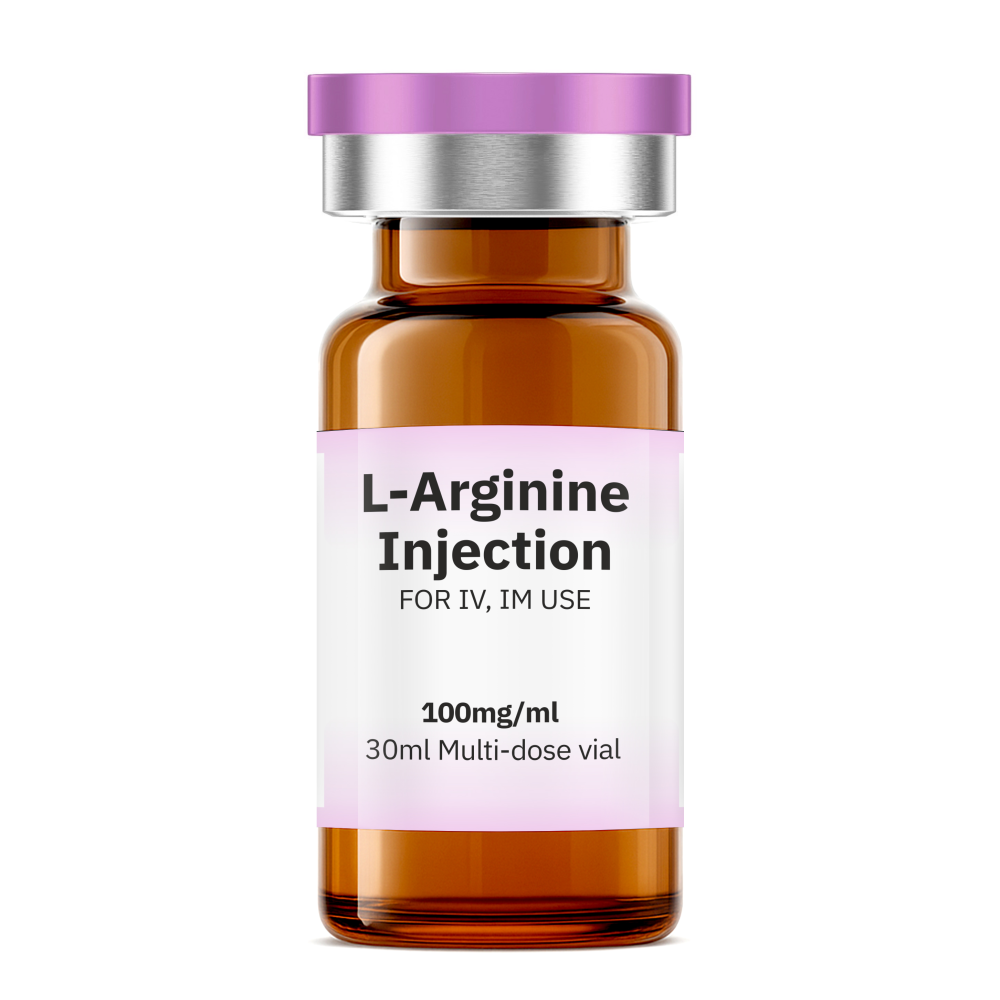
L-Arginine 100mg/ml
L-Arginine Injection is primarily used as a diagnostic tool to assess pituitary gland function by stimulating the release of human growth hormone (HGH) [6][1]. Here are some key points about it: It is a naturally occurring amino acid.
Uses
Diagnostic Aid: It helps diagnose conditions like panhypopituitarism, pituitary dwarfism, and other growth-related issues [6][1].
Growth Hormone Stimulation: It is used to measure the reserve of HGH in the pituitary gland [6][1].
Available to ship to your site 3-4 weeks after ordered
-
30mL
-
L-Arginine Injection is administered intravenously by a healthcare professional. Here are the key steps
involved:
Preparation: The solution is prepared and checked for any particles or discolorationIntravenous Injection: A needle is placed into one of your veins.
Slow Infusion: The injection is given slowly, typically over a period of 30 minutes [1][2].
Monitoring: The healthcare provider will monitor you during the infusion to ensure there are no adverse reactions [1][3].
-
L-Arginine Injection works by stimulating the pituitary gland to release growth hormone (GH) and prolactin. This process involves the hypothalamus, which signals the pituitary to release these hormones [7][2].
In patients with normal pituitary function, this results in a significant increase in plasma concentrations of growth hormone. However, in patients with impaired pituitary function, there is little to no increase in GH levels after administration [7][2].
-
Precautions
Hypersensitivity: Contraindicated in individuals with known hypersensitivity to any of its components [6].
Pediatric Use: Extreme caution is required when used in pediatric patients due to the risk of severe side effects [6].
-
Drug Interactions
Anticoagulants and Antiplatelet Drugs: L-Arginine may increase the risk of bleeding when taken with these medications [1].
Blood Pressure Medications: It can enhance the effects of blood pressure-lowering drugs, potentially causing hypotension [1][8].
Nitrates: Combining L-Arginine with nitrates (e.g., nitroglycerin) can lead to excessive vasodilation and hypotension [2][1].
Diabetes Medications: It may affect blood sugar levels, so caution is advised when used with diabetes medications [1].
Sildenafil (Viagra): L-Arginine can enhance the blood pressure-lowering effects of sildenafil [8].
Supplement Interactions
Herbs and Supplements: Those that affect blood clotting (e.g., ginkgo biloba, garlic) or blood pressure (e.g., omega-3 fatty acids) may interact with L-Arginine [1].
Disease Interactions
Electrolyte Imbalances: L-Arginine can exacerbate conditions related to electrolyte imbalances [3].
It’s always best to consult with a healthcare provider before starting or stopping any medication or supplement to avoid potential interactions.
-
Common Side Effects
Headache [2]
Nausea and Vomiting [2]
Flushing [2]
Local Venous Irritation: Pain, redness, or swelling at the injection site [2]
Less Common Side Effects
Dizziness [9]
Bloating and Diarrhea [9]
Numbness [2]
Serious Side Effects
Allergic Reactions: Hives, itching, rash, difficulty breathing, or tightness in the chest [9]
Hyperchloremic Metabolic Acidosis: An imbalance in the body’s acid-base balance3
Cerebral Edema: Swelling in the brain3
Severe Hypersensitivity Reactions: Potentially life-threatening3
Rare Side Effects
Redness or Discoloration of the Skin3
Swelling of the Hands and Face3
Rapid Heartbeat3
Blood in the Urine3
-
Pregnancy
Potential Benefits: L-Arginine has been studied for its potential to prevent and treat preeclampsia, a condition characterized by high blood pressure and protein in the urine [10]. It may also improve fetoplacental circulation and birth outcomes in cases of fetal growth restriction [11].
Safety: While some studies suggest benefits, it’s crucial to consult with a healthcare provider before using L-Arginine during pregnancy to ensure it’s appropriate for your specific situation [12].
Breastfeeding
Limited Data: There is not enough research to confirm whether L-Arginine passes into breast milk [9]. Therefore, caution is advised, and it’s best to discuss with your healthcare provider before using it while breastfeeding [12].
-
L-Arginine Injection should be stored at controlled room temperature, typically around 25°C (77°F) [2]. It’s important to avoid excessive heat and not to refrigerate the solution [4][5].
-
1. mayoclinic.org 2. reference.medscape.com 3. drugs.com 4. medinfogalway.ie
5. olympiapharmacy.com 6. accessdata.fda.gov 7. medicine.com 8. medicalnewstoday.com
9. myclevelandclinic.com 10. healthline.com 11. tandfonline.com 12. bing.com


